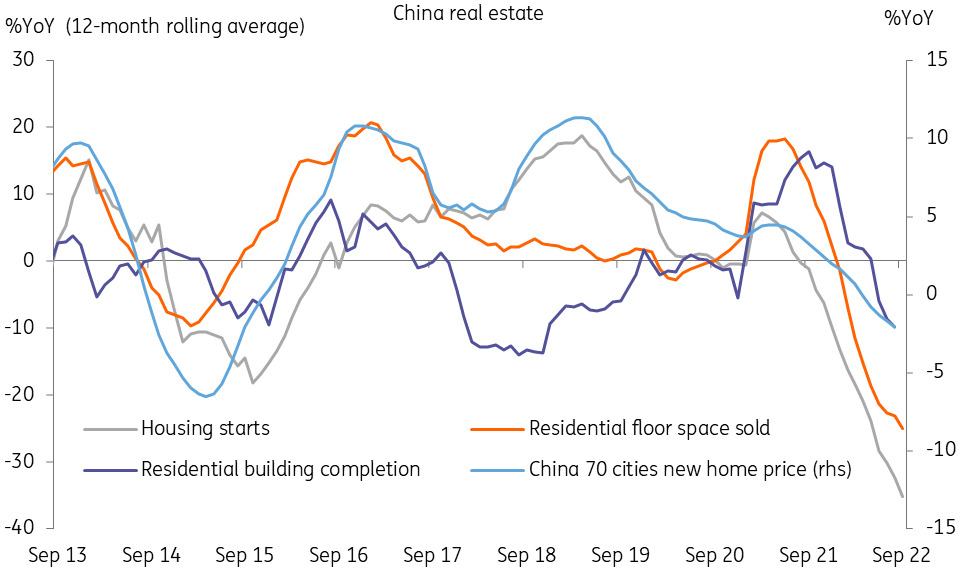China: recovery derailed by real estate crisis
The economy has recovered slightly due to more flexible Covid measures. But the real estate crisis will put pressure on economic growth if home sales do not pick up. Infrastructure stimulus has yet to impact growth as local government spending has been split between finishing uncompleted homes and infrastructure investment
China finally show signs of a slight recovery
More flexible Covid measures have resulted in shorter quarantine periods and more localised lockdowns, which have had less impact on the labour force than the measures imposed a few months back. Consumers have shown a willingness to buy electric vehicles with government subsidies, and are also eating out more. But they are still reluctant to buy luxury items. Overall, retail sales grew 5.4% year-on-year in August after 2.7% growth in July.
Industrial production also picked up to 4.2% YoY in August from 3.8% in July as more flexible Covid measures enabled more people to go to work.
As such, the People's Bank of China did not cut interest rates in September.
China retail sales show recovery

Real estate crisis
In the real estate market, some local governments have been pairing with property developers to finish uncompleted projects. But an improvement in market sentiment will only happen if some of the larger projects are finished to a high standard. Home buying activity should then pick up.
The market is now seeing genuine demand. The government is trying to fully unleash this demand by implementing policies such as cutting taxes for home upgrades. There are also policies for first-time buyers with lower mortgage rates. This fresh demand seems to be re-activating existing home sales, which were sluggish in the past due to a lot of new builds coming onto the market. This shift could reduce demand for new homes as buyers may worry that houses bought off-plan may not be completed. This, in turn, does not help housing starts. But at least some buyers are back in the market.
The long delay of fiscal stimulus
Facing both a Covid crisis and a real estate crisis, local governments with limited fiscal resources have had to prioritise what to deal with first. For most of them, the more urgent problem has been the stagnation in housing starts - and thus the drop in land auctions, which have traditionally provided local governments with the revenue they need to run their governments properly.
This explains the delay in infrastructure projects even as local government special bonds have been issued for this year. Even though the central government has called for an increase in infrastructure investment, only a few local governments have actually accelerated spending and they are mainly investing in existing projects, not new ones.

Double whammy is coming
External demand could be weaker in 2023. If the real estate crisis and decisions over Covid measures cannot be resolved (at least partially) China could face a tough year ahead, especially in manufacturing.
Download
Download article6 October 2022
ING’s October Monthly: bracing for a tough winter This bundle contains {bundle_entries}{/bundle_entries} articles"THINK Outside" is a collection of specially commissioned content from third-party sources, such as economic think-tanks and academic institutions, that ING deems reliable and from non-research departments within ING. ING Bank N.V. ("ING") uses these sources to expand the range of opinions you can find on the THINK website. Some of these sources are not the property of or managed by ING, and therefore ING cannot always guarantee the correctness, completeness, actuality and quality of such sources, nor the availability at any given time of the data and information provided, and ING cannot accept any liability in this respect, insofar as this is permissible pursuant to the applicable laws and regulations.
This publication does not necessarily reflect the ING house view. This publication has been prepared solely for information purposes without regard to any particular user's investment objectives, financial situation, or means. The information in the publication is not an investment recommendation and it is not investment, legal or tax advice or an offer or solicitation to purchase or sell any financial instrument. Reasonable care has been taken to ensure that this publication is not untrue or misleading when published, but ING does not represent that it is accurate or complete. ING does not accept any liability for any direct, indirect or consequential loss arising from any use of this publication. Unless otherwise stated, any views, forecasts, or estimates are solely those of the author(s), as of the date of the publication and are subject to change without notice.
The distribution of this publication may be restricted by law or regulation in different jurisdictions and persons into whose possession this publication comes should inform themselves about, and observe, such restrictions.
Copyright and database rights protection exists in this report and it may not be reproduced, distributed or published by any person for any purpose without the prior express consent of ING. All rights are reserved.
ING Bank N.V. is authorised by the Dutch Central Bank and supervised by the European Central Bank (ECB), the Dutch Central Bank (DNB) and the Dutch Authority for the Financial Markets (AFM). ING Bank N.V. is incorporated in the Netherlands (Trade Register no. 33031431 Amsterdam).
